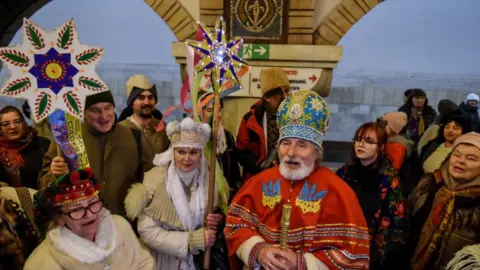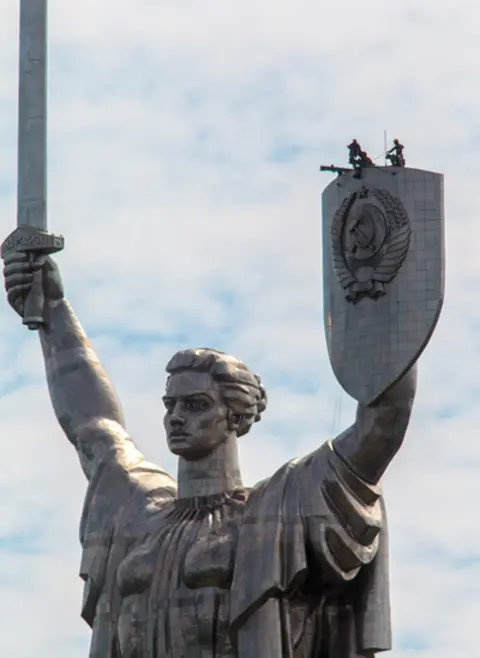Ukraine moves Christmas Day in snub to Russia
 EPA-EFE/REX/Shutterstock
EPA-EFE/REX/ShutterstockUkraine has moved its official Christmas Day state holiday from 7 January to 25 December, the latest move aimed at distancing itself from Russia.
President Volodymyr Zelensky signed into law a parliamentary bill that aimed to "abandon the Russian heritage of imposing Christmas celebrations".
In recent years, Kyiv has been cutting religious, cultural and other ties with Russia, aligning itself with the West.
This process escalated following Russia's full-scale invasion in 2022.
Mr Zelensky signed the bill on Friday - two weeks after it had been passed by Ukrainian lawmakers.
The legislation also moves another two state holidays, Day of Ukrainian Statehood, from 28 July to 15 July, and the Defenders' Day, which commemorates armed forces veterans, from 14 October to 1 October.
Moscow has so far made no public comments on the issue.
For centuries, first imperial Russia and then the Moscow-dominated Soviet Union had tried - but always failed - to totally control Ukraine.
This included the imposed authority of the Russian Orthodox Church (ROC) over Ukraine's churches.
But in 2019, the recently formed Orthodox Church of Ukraine (OCU) was granted independence by Ecumenical Patriarch Bartholomew, the spiritual leader of Orthodox Christians worldwide.
The move provoked a furious response in the ROC, which is openly defending President Vladimir Putin's invasion of Ukraine.
Until this year, the OCU - like several other Orthodox churches, including the ROC - celebrated Christmas Day on 7 January, in line with the Julian calendar.
But the OCU has now officially switched to the more-precise Gregorian calendar used in most parts of the world.
In recent years many Ukrainian worshippers have been joining the OCU, and the majority of them are now likely to be celebrating Christmas on 25 December.
There will also be those marking Christmas twice.
At the same time, millions still follow the Ukrainian Orthodox Church (UOC), the other established branch with parishes all over the country.
The UOC has not commented on the latest developments.
It officially declared a split from Moscow in 2022 - but a number of its clerics have recently been prosecuted for pro-Russian activities.
The UOC says there is no evidence to support the charges of collaboration.
 Future Publishing via Getty Images
Future Publishing via Getty ImagesUkraine's decision to move Christmas is the latest step by the country to distance itself from its north-eastern neighbour.
Cities and villages all over Ukraine have recently seen renaming of their streets linked to Russian and Soviet historical figures.
Similarly, a number of monuments have been taken down, and Russian films made after 2014 banned in Ukraine.
Those measures followed Russia's illegal annexation of Ukraine's southern Crimea peninsula in March 2014.
